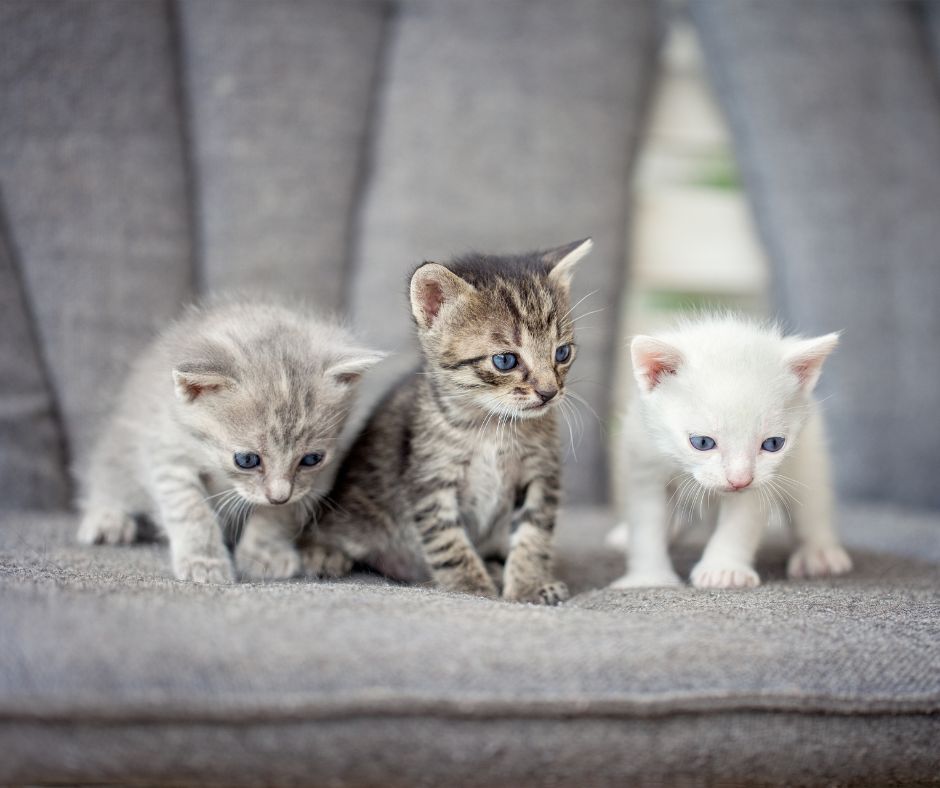Important things to know about new kitten care
 Adopting and bringing home a new kitten is a very exciting time. Everything is brand-new for your kitten and for you too. It may feel a bit overwhelming to start afresh with this new life in your home, but here are some very important parts of kitten care that you absolutely should not skip. The over-arching reason for ensuring you check all these care boxes is to keep your kitten as healthy as possible and to be a responsible pet parent.
Adopting and bringing home a new kitten is a very exciting time. Everything is brand-new for your kitten and for you too. It may feel a bit overwhelming to start afresh with this new life in your home, but here are some very important parts of kitten care that you absolutely should not skip. The over-arching reason for ensuring you check all these care boxes is to keep your kitten as healthy as possible and to be a responsible pet parent.
Keep up your kitten’s vaccinations
Vaccinations are injections given to your kitten to help them produce immunity against some of the most common and dangerous feline diseases. Your kitten will get immunity against various diseases from the mommy cat, but this immunity starts to decrease when your kitten turns six weeks old. Until your kitten is about 16 weeks old, their immune system is not yet strong enough to fully protect them from these diseases, which is why we give kittens multiple vaccinations at two- to four-week intervals during this time. It is important that their last kitten vaccinations are given at 16 weeks or later.
The vaccinations given to your kitten will provide protection against feline herpesvirus, feline calicivirus, feline panleukopaenia virus and rabies. Some vaccines have an additional component against Chlamydia conjunctivitis infections. Take note that unfortunately vaccination does not provide 100% protection against all diseases, so it’s vital to limit your kitten’s exposure to potential disease-carrying cats.
What are FIV and FeLV?
Feline Immunodeficiency Virus (FIV) and Feline Leukaemia Virus (FeLV) are common viral infections in cats and can have potentially life-threatening consequences. Kittens can contract these viruses from infected cats that they come into contact with, including the mother cat. They can cause a subclinical infection, meaning that your cat may be infected and not show any symptoms for months or even years. During this time, your cat is a risk for transmitting the virus to other cats.
In the initial stages both viruses can cause a fever, poor appetite and lethargy. If cats recover from this, they can develop a long-standing infection that eventually leads to increased susceptibility to infectious diseases, anaemia, formation of tumours (such as lymphoma) and chronic mouth inflammation, to name a few.
All cats should be tested for FIV and FeLV. Knowing the status of your cats will help you to make informed decisions about allowing your cats to have contact with other cats both in your household and outside (i.e. whether your cat should be kept an indoor-only cat). Cats that carry either or both of these viruses should always be kept separate from other cats. This is to prevent them from infecting other cats, but also to protect them from contracting any infections other cats may be carrying.
The test is performed at the veterinary practice after collection of a blood sample, and the results are usually available within an hour. It’s best to keep your new kitten or cat separate from your other cats (if any) until the statuses of all cats in the household are known.
Keep the worms away
Worms have evolved to very successfully transmit themselves from mommy cats to kittens. Vets consider all young animals to be born with worms, so kittens are dewormed at each vaccination. After worms in the intestine have been killed, immature worms from the tissues will move into the intestine. By repeatedly deworming them the vet can kill each new infection that forms. After kitten vaccinations and deworming, all cats should be dewormed once every three months.
Test for these parasites before they become a problem
Worms are not the only parasites that can infect your kitten. Giardia and coccidia are common intestinal parasites that can cause vomiting, diarrhoea and a poor appetite. The vet should test your new kitten for these parasites as soon as you’ve adopted them. If these parasites are found, the vet will be able to treat your kitten before they become very ill.
Always prevent ticks and fleas
Ticks and fleas are parasites that live on your pet’s skin. They suck blood, which can cause anaemia (low red blood cell levels), itching and skin wounds, and transmit diseases. These parasites can be as small as the head of a pin, so not being able to see them does not mean your pet doesn’t carry them. Your kitten can pick them up from your home, your garden, or stray cats that come into your yard. The best means of control is to preventatively treat against these parasites. The vet will help you to choose the best product for your needs. A common misconception is that these treatments are only necessary in the warm months of the year. Although ticks and fleas will decrease during the cooler months, they will never go away entirely, which is why all vets recommend maintaining parasite treatments throughout the year.
Your kitten’s nutritional needs
We already know that people who eat a nutritious diet are healthier and live longer lives than people who eat an unhealthy diet. The same is true for our pets. Good nutrition is particularly important in kittens as their bodies are growing and developing. The vet will recommend a scientifically balanced diet that has been designed to meet all of your kitten’s nutritional requirements to grow up strong and healthy. Your kitten should be able to chew pelleted or kibble foods from six weeks of age, so from this time, it is important to feed your kitten only the recommended diet with occasional cat treats. This means that your kitten should not be getting any human food. Our food can be too rich for their little tummies and some of the ingredients we use can be toxic to cats. The vet will advise you on the best diet for your new kitten.
Be kitten-wise and sterilise your pet!
Sterilisation describes the surgical procedure of removing a pet’s reproductive organs so that they are not be able to reproduce. In female cats we call this procedure a spay or ovariohysterectomy. In male cats we refer to it as neutering or castration. Another familiar term is ‘having them fixed'.
Sterilisation is recommended for many reasons. There is a major pet overpopulation problem in South Africa, with thousands of homeless dogs and cats in shelters waiting to be adopted. The primary reason for this is indiscriminate breeding and unintended litters from pets that have not been spayed. By having your pet sterilised before they can reproduce, you ensure that fewer animals are abandoned.
There are also important health benefits to sterilisation. Spaying female cats decreases the chances of them getting mammary gland cancer (like breast cancer) later in life. Pyometra is a life-threatening uterus infection, which can be avoided altogether by having your cat spayed as the uterus will be removed. Sterilised cats are less likely to roam far and fight with other cats. This means they are less likely to be hit by cars, mauled by dogs, get into cat fights and contract infections such as FIV and FeLV. Additionally, male cats are very inclined to mark their territory by urinating (referred to as ‘spraying’) on walls, doors and other upright objects. This behaviour is lessened in male cats neutered at a young age.
Vets recommend sterilisation at an age of five to six months old, as cats are mature enough to mate and produce kittens at this age already. It is better to have this procedure done sooner rather than later.
Pet parents are often concerned about their pet’s personality changing after sterilisation or them gaining weight. It is true that sterilised animals are more prone to being overweight, but simple management of their food intake and ensuring they get enough daily exercise will keep them in tip top condition. Rest assured that sterilisation will not change your pet’s personality.
Microchipping – Never lose your cat
If your pet does not already have a microchip implanted, it is strongly recommend that you do so. The microchip is as small as a grain of rice and gets implanted by injection into the area between the shoulder blades. The procedure is fast and no more painful than a vaccination injection. The microchip transmits a signal with a unique number that is registered to you. Should your pet go missing and be taken to a vet or a shelter, they will be scanned for a microchip. You will then be contacted and your pet can be returned to you. Unfortunately, many animals in South Africa do not have microchips. This leads to large numbers of animals ending up in shelters with their owners never being able to find them. By having a microchip your pet can always find their way back home should they go missing.
Financial peace of mind with pet insurance
Pet insurance is medical cover for your pet. Unfortunately, pet illness and injury are a part of life and veterinary care is necessary and sometimes expensive. Having pet insurance means that you are able to make the best decisions for your pet’s medical care, rather than cutting corners. There are various products available and the vet will advise you on the best one for your needs. It’s important to consider a plan that provides at least accidental and illness cover, so that you can get care for your pet if they are unwell or have a medical emergency.
Some plans will include a wellness benefit, which will make a contribution to routine care treatments such as annual health checks, vaccinations, deworming, tick and flea treatments and dental procedures. Hereditary illnesses are those that are inherited from the parents and are not often covered in pet insurance policies. Should you have a breed of cat that is known to have hereditary problems, it would be beneficial to include this cover in your policy. When you take out an insurance policy for your pet, make sure that you fully understand the benefits, terms and conditions of your policy, to avoid unwelcome surprises later on.
In conclusion
Your new kitten’s life just improved ten-fold, but it’s important that you consider all aspects of their wellbeing and make sure these are met. From medical (vaccination, deworming, parasite control and sterilisation), nutritional, financial and social requirements, to physical exercise and mental stimulation – kitten care involves many more facets than simply play, feed and sleep. If you need any help with the care of your new furry family member, please reach out to the vet for a consultation.
© 2022 Vetwebsites – The Code Company Trading (Pty) Ltd


